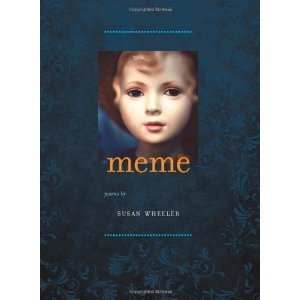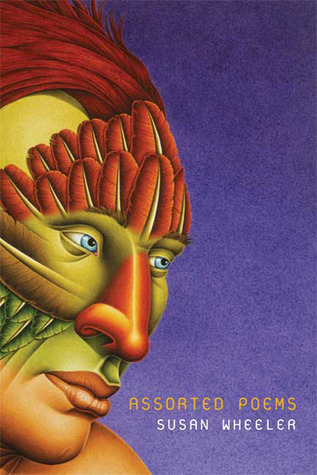Books
Revisiting a mother's speech -- Poetry Society of America.
Assorted Poems
Assorted Poems is a generous selection from the first four books by one of the most distinctive voices in contemporary poetry. In Bag o’ Diamonds (1993), Smokes (1998), Source Codes (2001), and Ledger (2005), Susan Wheeler has established herself as a poet of rare gifts. Her work is allusive and searching, sweeping over time and place, from the art of the northern Renaissance to corporate logos, observing and exploring everything with characteristic precision and intelligence. The poems are both rigorous and free, taking on our culture, its beauties and cruelties, its relationship to the past and its uncertain future. Assorted Poems is a vibrantly thoughtful and entertaining book, a mustread from a poet whom Harold Bloom has called “an exuberant, subtle, endlessly inventive original.”
Record Palace
"In hazed heat, mid-September, walking north from Chicago’s Loop, telling myself I was exploring the new life, I dogged as much for tonic, gin. A sign swung beside a basement door, in, out, mirage: RECORD PALACE: J ZZ. Inside I found Acie."
Cindy, a lean, lonely white girl, has come to Chicago to study art history—to be anywhere but where she came from—tract housing in Thousand Oaks, California, mock-stucco buildings, “a tetherball hole in the ten-foot driveway…incessant sun and incessant sunniness of every blonde girl.”
The Record Palace, littered with cans of malt liquor and remnants of past meals, also has boxes upon boxes of records—all jazz. And it has Acie, “big on all sides, top included. A hairnet, the hair below the net long and limp with oil. Green stretch pants, flip-flops, a think black U-tank taut across Sumo folds. Maybe a hundred bins were blocked by the wall of him.” Cindy knows she doesn’t belong, and this is why she stays.
Cindy’s determination leads to a tentative friendship with Acie and she becomes a familiar, if not fully understood, presence in the store. But it is through her chance meeting with Acie’s “offspring” that she becomes embroiled in an unusual crime.
With prose that resembles the syncopated rhythms of jazz, Wheeler offers a stunning portrait of a women searching for an identity in a city on the cusp of social and political change.
"An exquisitely crafted recollection of music, at a pivotal time for both jazz and Chicago." - Steve Martin
"Dialogic, atmospheric, a situation plumbed rather than a plot unfolded - a Chicago noir this is and it casts its spell. - E.L. Doctorow
Cindy, a lean, lonely white girl, has come to Chicago to study art history—to be anywhere but where she came from—tract housing in Thousand Oaks, California, mock-stucco buildings, “a tetherball hole in the ten-foot driveway…incessant sun and incessant sunniness of every blonde girl.”
The Record Palace, littered with cans of malt liquor and remnants of past meals, also has boxes upon boxes of records—all jazz. And it has Acie, “big on all sides, top included. A hairnet, the hair below the net long and limp with oil. Green stretch pants, flip-flops, a think black U-tank taut across Sumo folds. Maybe a hundred bins were blocked by the wall of him.” Cindy knows she doesn’t belong, and this is why she stays.
Cindy’s determination leads to a tentative friendship with Acie and she becomes a familiar, if not fully understood, presence in the store. But it is through her chance meeting with Acie’s “offspring” that she becomes embroiled in an unusual crime.
With prose that resembles the syncopated rhythms of jazz, Wheeler offers a stunning portrait of a women searching for an identity in a city on the cusp of social and political change.
"An exquisitely crafted recollection of music, at a pivotal time for both jazz and Chicago." - Steve Martin
"Dialogic, atmospheric, a situation plumbed rather than a plot unfolded - a Chicago noir this is and it casts its spell. - E.L. Doctorow
Ledger
The many meanings of "economy" are the ground for the mediation and lament of Ledger, Susan Wheeler's fourth book. In its Greek origins, economy referred to the stewardship of a household and, as it developed, the word also came to include aspects of government and of religious faith. Ledger places an individual's crisis of spirituality and personal stewardship, or management of her resources, against a backdrop of a culture that has focused its "economy" on financial gain and has misspent its own tangible and intangible resources.
"Susan Wheeler is an exuberant, subtle, endlessly inventive original, and Ledger marks a wonderful advance in her already vital contribution to American poetry. Best of all in Ledger's varied pleasures is 'The Debtor in the Convex Mirror,' an intricate splendor and triumphant fusion of technique and vision." - Harold Bloom
"Part narrative, part satire, part cri de coeur, Susan Wheeler's densely wrought new poems are alternately hilarious and chilling in their power to evoke the terrible contradictions of daily life in our media-driven landscape. Wheeler is that rare thing among poets, a genuine cultural critic; her poems use image and allusion with such exactitude that we see the things around us-from pop tarts to polyvinylled toilet seats-as if for the first time. Ledger is a dazzling collection." - Marjorie Perloff
"If Baudelaire was, for Walter Benjamin, the lyric poet of the era of high capitalism, Susan Wheeler is a lyric poet for an era of superstores, global corporations, and product tie-ins. A ledger is a measure of accounts, and Wheelerís Ledger assesses the place of value in a market-driven world where indebtedness has replaced belief and logos have replaced Logos. Her poems draw on a wealth of sources--from 17th century religious poetry and Flemish painting to contemporary consumerism--in an effort to define our tenancy to rich lords and concurrent losses to the human heart." - Michael Davidson
"Susan Wheeler is an exuberant, subtle, endlessly inventive original, and Ledger marks a wonderful advance in her already vital contribution to American poetry. Best of all in Ledger's varied pleasures is 'The Debtor in the Convex Mirror,' an intricate splendor and triumphant fusion of technique and vision." - Harold Bloom
"Part narrative, part satire, part cri de coeur, Susan Wheeler's densely wrought new poems are alternately hilarious and chilling in their power to evoke the terrible contradictions of daily life in our media-driven landscape. Wheeler is that rare thing among poets, a genuine cultural critic; her poems use image and allusion with such exactitude that we see the things around us-from pop tarts to polyvinylled toilet seats-as if for the first time. Ledger is a dazzling collection." - Marjorie Perloff
"If Baudelaire was, for Walter Benjamin, the lyric poet of the era of high capitalism, Susan Wheeler is a lyric poet for an era of superstores, global corporations, and product tie-ins. A ledger is a measure of accounts, and Wheelerís Ledger assesses the place of value in a market-driven world where indebtedness has replaced belief and logos have replaced Logos. Her poems draw on a wealth of sources--from 17th century religious poetry and Flemish painting to contemporary consumerism--in an effort to define our tenancy to rich lords and concurrent losses to the human heart." - Michael Davidson
Source Codes
A book of numbered, untitled poems and collages, each linked to the next by an element in its image or first or last lines. A "key" in the table of contents provides the source-reference for every one, and three appendices - two of handwritten drafts and one of computer source code - round out the collection.
Wheeler's pantheon of effects takes in everything from jingles, tight syllabic stanzas, the odd mix of stentorian modes and cartoonlike plasticity from middle-period Ashbery, pseudo-didactic literariness, myths, fables, surrealist mantras and Swiftian turns. Formally dazzling and spiritually unforgiving, this is an important, limit-testing book.
- Publishers Weekly
Wheeler's pantheon of effects takes in everything from jingles, tight syllabic stanzas, the odd mix of stentorian modes and cartoonlike plasticity from middle-period Ashbery, pseudo-didactic literariness, myths, fables, surrealist mantras and Swiftian turns. Formally dazzling and spiritually unforgiving, this is an important, limit-testing book.
- Publishers Weekly
Smokes
Smokes contains elegies, poems of urban and domestic angst, laments, invectives, cakewalks, struts. It's very much of the moment but it is also a deeply literary book . . . its confident, rueful, and playful grasp of its tradition is eye-opening and, sardonic as it is, boisterous fun.
- Robert Hass, from the afterword
The book's desire to astound, contort, pervert and yet sing at all turns makes it a singular delight.
- Publishers Weekly
If all poems have specific enemies, and if all good poems resist those enemies, it is clear that two of Wheeler's poems' enemies are regularity and predictability. . . It is perhaps less apparent that her poems' other enemies include arbitrariness and randomness. I am thinking in part of her frequent use of conventional infrastructures - couplets, rhymed quatrains, sonnets, a pantoum, a ballad - and in part of her steely grammatical and syntactical control.
- Stephen Yenser, The Yale Review
- Robert Hass, from the afterword
The book's desire to astound, contort, pervert and yet sing at all turns makes it a singular delight.
- Publishers Weekly
If all poems have specific enemies, and if all good poems resist those enemies, it is clear that two of Wheeler's poems' enemies are regularity and predictability. . . It is perhaps less apparent that her poems' other enemies include arbitrariness and randomness. I am thinking in part of her frequent use of conventional infrastructures - couplets, rhymed quatrains, sonnets, a pantoum, a ballad - and in part of her steely grammatical and syntactical control.
- Stephen Yenser, The Yale Review



